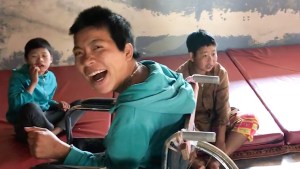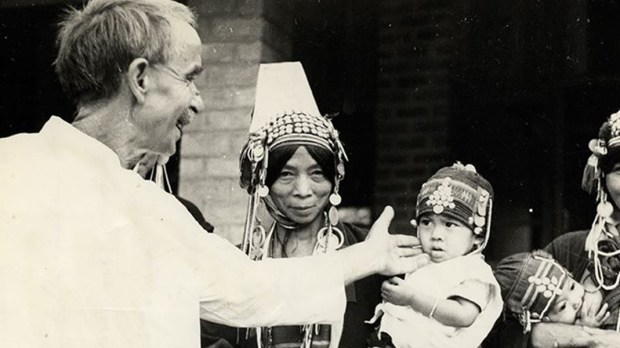Felice Tantardini was born on June 28, 1898, in the Lecco state of Italy. Felice (which means “happy” in Italian) was the sixth of eight children born to devout Catholic parents Battista Tantardini and Maria Magni. Felice became a participant in Tantardini family prayer as an infant. Every evening his mom would hold him in her arms, nursing him if necessary, as the family gathered together to pray the Rosary.
Felice was small of size but big of heart. He had to attend third grade twice to stay up to date with his primary education. Felice’s older brother, Giuseppe, had a blacksmith shop and Felice began working there as an apprentice every day after school. During the spring of 1911, tragedy struck the Tantardini family.
Mr. Tantardini operated an electrical workshop that was located very close to the Troggia Waterfall. A flash flood swept over the area, killing Mr. Tantardini. The family was devastated. Soon after, as Italy was entering World War I, the Ansaldo Power Plant of Genoa hired Felice. Since he was working for a company that was important for the new war effort, he was classified as exempt from military duty.
However Felice had registered for the draft, and when the Italians were defeated at Caporetto in October, he was called to active duty. He was in training until early January and then sent to the front. Incredibly, after only two days on the front lines, he and 60 of his fellow soldiers were captured by the Germans. They were all taken to Vittorio Veneto where they were put to work repairing and building railroads. Frail as Felice was, the cold weather and rain and snow quickly affected his health.

Read more:
Tiny Christian communities in Myanmar, Bangladesh are hope for future, says pope
He and some of the others were transferred from one camp to another: from Udine to Gorizia and Belgrade, Serbia. Finally, Felice and four others made an escape by crawling like sewer rats through a drainage channel. Remarkably, they succeeded and made it all the way to Greece and then Italy. In June of 2019 (100 years ago this month), he made it to his hometown of Introbio. He was welcomed, given 18 days of rest and relaxation, and then sent with others to occupy the Greek island of Kalimno. Three months later he was discharged.
Felice had felt the calling to religious life from when he was a young boy. The calling began getting louder when his father died and even louder during his time in the military. Now, back in civilian life and working as a blacksmith and then as an electrician at a mining company, he felt the calling was reaching a crescendo. His sister, Anna, had saved old issues of Catholic Mission and given them to Felice. He was reading them over and over. Finally, Felice had no doubt that he was being called to be a missionary.
However, Felice was under pressure from his boss who wanted him to marry one of his three daughters. Luckily, his mom was his biggest supporter. She advised him to carefully discern what he wanted to do and if he chose the missionary life, to follow it and trust in God.
Felice Tantardini joined the PIME Missionaries on September 20, 1921. On June 24 of the following year, he received his clerical garments; on August 15 his missionary crucifix; and on September 2, 1922, he headed to Burma (today Myanmar) as a Lay Brother. He was 24 years old.
Brother Felice would remain in Burma for the next 70 years. He did go back to Italy from April 1956 thru January 1957, for health reasons. But then it was right back to the burning sun, torrential rains, bandits, guerrillas, tigers, snakes, and other challenges that had become part of his life over the previous 34 years.
As he traveled from mission to mission throughout Burma, Brother Felice helped build churches, convents, orphanages, hospitals, even bridges. If necessary, he would be a carpenter, an electrician, a gardener, a farmer, a bricklayer, mechanic, nurse, plumber, and, when appropriate, a catechist. With his ever-present pipe clenched between his teeth, he always did his work with a smile on his face. He even took the time to work with lepers.
Brother Felice became known as the “Blacksmith of God.” Many referred to him as “Brother Happy.” He died at the age of 93. He was buried in the garden of the disabled center of the Holy Infant Jesus in Payaphyu. His tomb became a place of pilgrimage as miracles were reported there.
Brother Felice Tantardini was recognized as Venerable on June 11, 2019, by Pope Francis who recognized Brother Felice’s life of Heroic Virtue.
We ask Venerable Felice Tantardini to pray for us all.

Read more:
Nuns from Myanmar care for the disabled and educate the young

